Results 1 to 9 of 9
Thread: Imperial razor restoration
-
08-21-2013, 08:19 PM #1Junior Member

- Join Date
- Aug 2013
- Location
- Montreal, Qc
- Posts
- 6
Thanked: 0 Imperial razor restoration
Imperial razor restoration
Hi everyone!
I bought an old razor that I plan to restore and I would like to know what do you think of the condition of the blade. I don't know what are the dark zone on the blade, it looks more like stain than rust and I don't know it I will have to remove a lot of metal to make it shinny again.
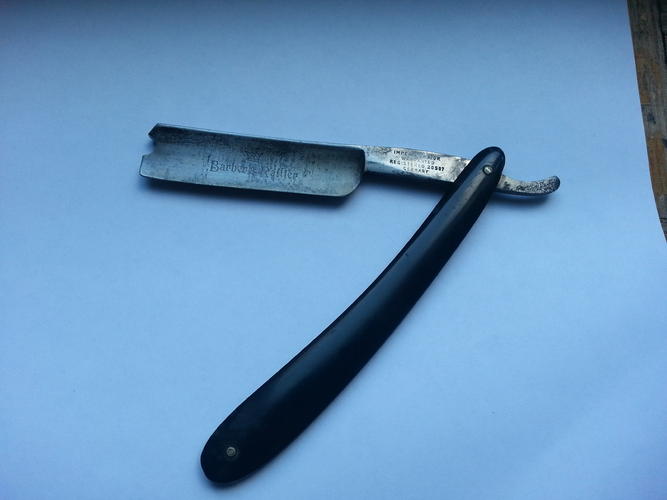
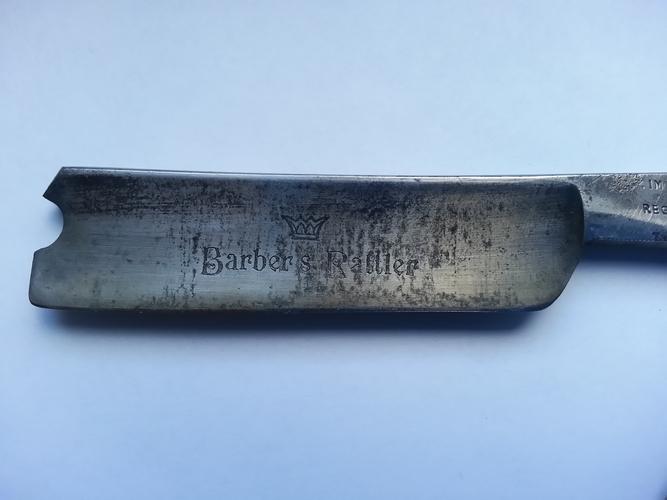
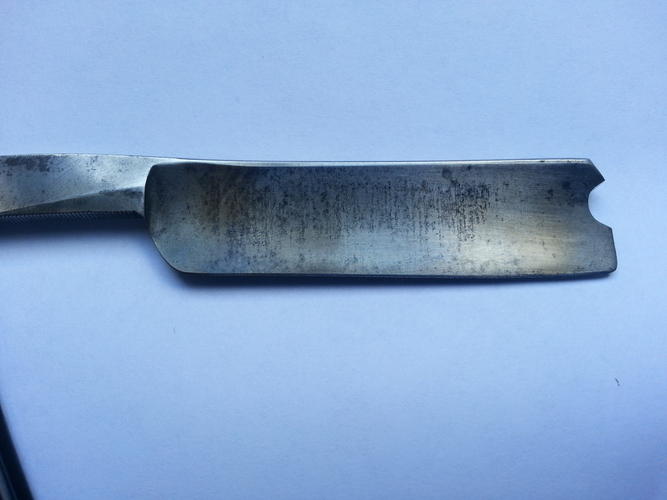
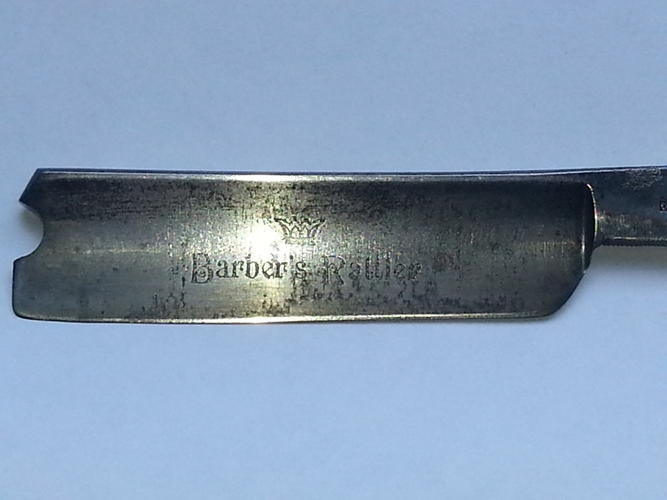
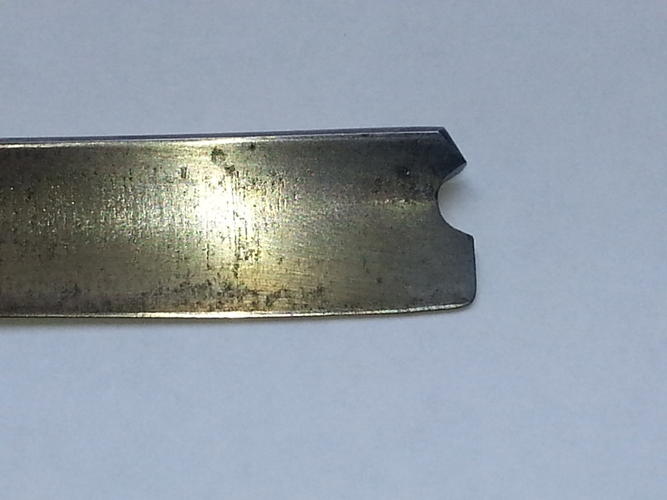
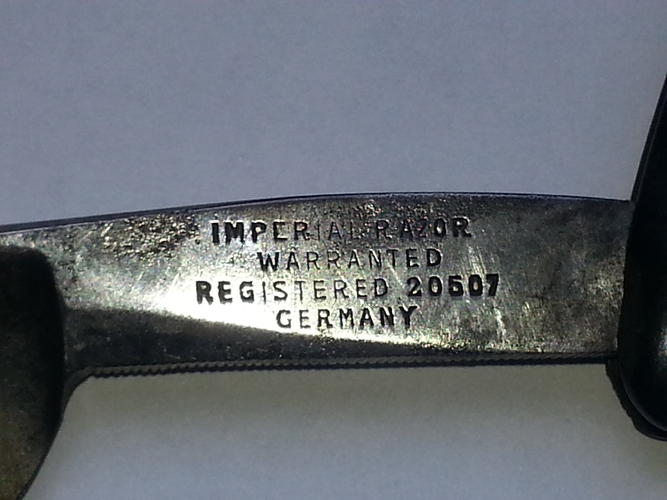
-
08-22-2013, 02:43 AM #2Lookin like a crim



- Join Date
- Apr 2009
- Location
- Coffs Harbour Australia, Home of the Big Banana
- Posts
- 2,706
Thanked: 1072
IMO that dark staining looks like pitting.
It will probably take a bit of metal removel to get it to a high polish. which may result in loosing the etch
I'd sand as much as posible without really compromising the etch myself. You'd probably be left with some patina/pitting, but to me, thats not a bad thing
Grant"I aint like that no more...my wife, she cured me of drinking and wickedness"
Clint Eastwood as William Munny in Unforgiven
-
08-22-2013, 05:28 AM #3

There seems to be original grind marks, so I think that a satin finish would be a good option that would look close to original. BTW a satin finish would also tend to hide any remaining pitting, so more of the etch could be saved.
Have fun and restore it to your tastes.
Jonathan
-
08-22-2013, 07:56 PM #4Junior Member

- Join Date
- Aug 2013
- Location
- Montreal, Qc
- Posts
- 6
Thanked: 0
Thank you for the replies, I like the idea of a satin finish. I will do some research on how to do it with sand paper, I guess that it's just to stop the progression to a lower grit. Also, I notices that a part of the edge seems to had been tapped on something, probably the sink. Do some stropping will realign the edge or it need to be honed to remove the tapped part?
-
08-22-2013, 08:13 PM #5

I sand mine down using a piece of sp wrapped around a cork.
I would start at about 800, see if it gets enough of the pitting out to make a usable edge. IMO that would not destroy the etch. If that doesn't work you could use it as artwork, or start again at a lower grit, knowing the etch will probably be sacrificed.
Not sure what you are talking about withthe tap marks, but stropping wont repair much of anything.
-
08-22-2013, 09:25 PM #6Junior Member

- Join Date
- Aug 2013
- Location
- Montreal, Qc
- Posts
- 6
Thanked: 0
The tap thing is not a mark, it looks like the edge had been knocked on something hard. When I move my thumb on the blade going from the spine to the edge, I can feel the bended edge. Here is a picture.
![Name: 20130822_172102[1].jpg
Views: 131
Size: 37.4 KB](https://sharprazorpalace.com/attachments/workshop/138517d1377206714-imperial-razor-restoration-20130822_172102-1-.jpg)
-
08-22-2013, 10:26 PM #7

Reading the blade from your photos, I see a lot of dark along the bevel/edge. In my experience, that has almost always lead to the loss of a significant amount of blade width to hone to solid steel. Your last photo shows the pitting above the bevel to be as much as almost through the blade in many places. I do not believe the blade has any use in the future except as a wall hanger. That said, I would suggest that you would hone it and see what I am speaking about as to the depth of the pitting. That will give you a good benchmark in the future.
I have honed away a good deal of the width of certain blades because that is the only way I could afford that steel quality and I had paid a pittance for the blade.
~RichardBe yourself; everyone else is already taken.
- Oscar Wilde
-
08-22-2013, 10:48 PM #8Junior Member

- Join Date
- Aug 2013
- Location
- Montreal, Qc
- Posts
- 6
Thanked: 0
Thank you for your advices. I got this razor for a very low price so I use it to practice the restoration. The dark line that you saw above the bevel in the last picture is not rust, but the shadow of the edge that is slightly bended. Is there a way to straighten it or the hone can take care of removing this part of the edge?
Since I never honed a razor before, I'm not sure what to expect from it. You must be right about the pitting, I'm curious to see what will happen after a lot pass on the stones. I hope that this experience will give me good clues for my future purchases of old razor.
-
08-23-2013, 10:37 AM #9

I have a Dubl Duck which I restored. It was in bad shape when I got it. I had to take quite a bit of metal off to get all the pitting. It honed well, and is usable, but dang is the cutting edge thin. You can see the edge flex when refreshing on a Barbers' hone!. Real gentle touch on with that one.


 2Likes
2Likes LinkBack URL
LinkBack URL About LinkBacks
About LinkBacks






 Reply With Quote
Reply With Quote


